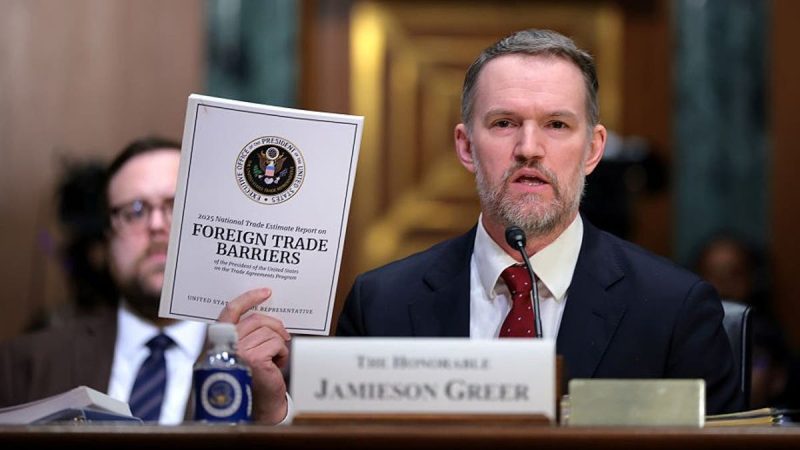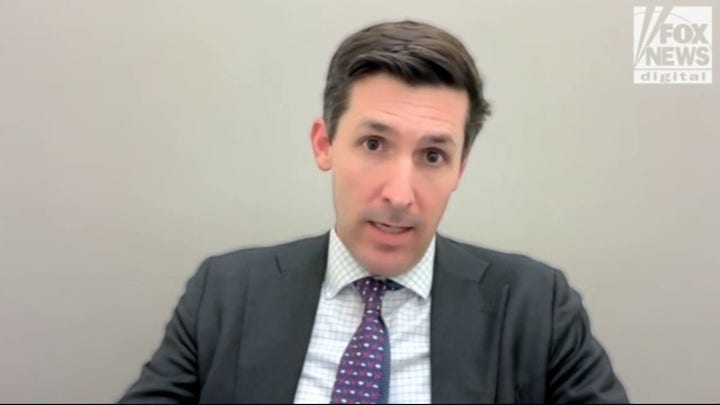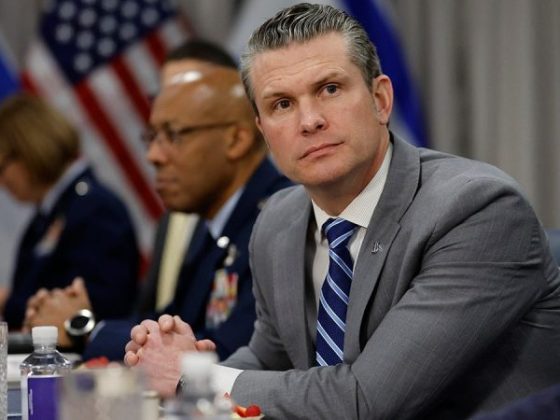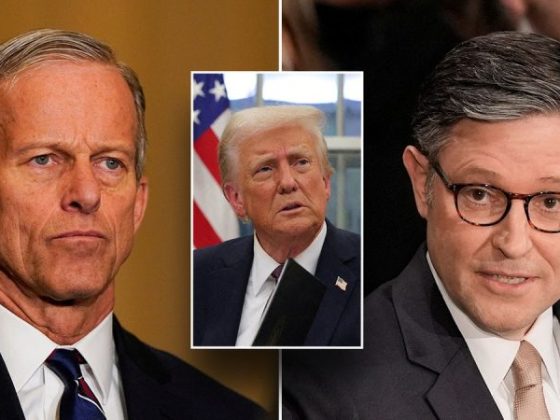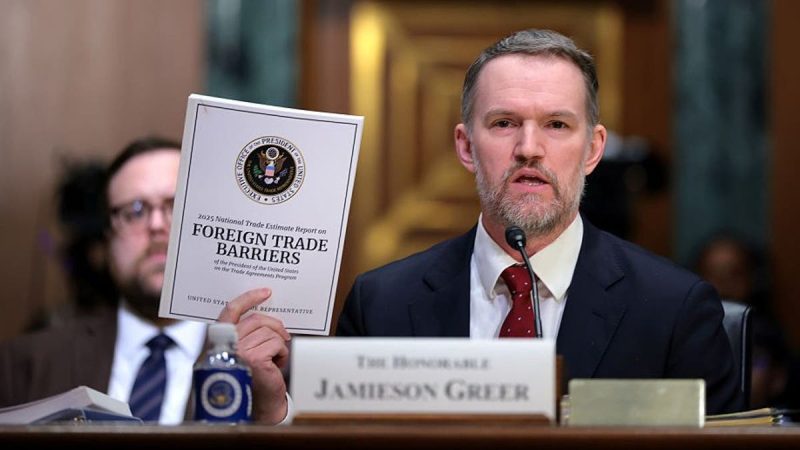
Wall Street rebounded into the green as multiple foreign countries came to the tariff negotiating table with President Donald Trump – but that was not enough to assuage some lawmakers’ critiques of the ‘alla prima’ tariff actions, as one Republican put it.
U.S. Trade Representative Jamieson Greer testified Tuesday the U.S. has long-suffered from ‘China Shock’ – the surge in manufacturing outputs from the Communist nation since the turn of the century – and that the U.S. had to do something substantive but strategic about the 5 million manufacturing jobs lost and 90,000 factories closed since the middle of the Clinton administration.
‘President Biden left us with a $1.2 trillion trade deficit-in-goods – the largest of any country in the history of the world,’ Greer said.
‘During COVID, we were unable to procure semiconductors to build our cars or materials for pharmaceuticals and personal protective equipment. During World War II, we built nearly 9,000 ships. Last year, the United States built only three ocean-going vessels,’ he said.
Greer said the U.S. historically was on the surplus side of agriculture trade but that, as of late, purportedly friendly countries like Australia have essentially rejected beef and pork exports, while America has not reciprocated with their livestock.
That became a sore subject during a particularly heated exchange between Greer and Sen. Mark Warner, D-Va., as the lawmaker claimed Trump unnecessarily ‘clobbered’ Canberra with a 10% tariff.
‘We have a free trade agreement with Australia,’ he said, questioning Trump’s ‘fancy Greek formula’ for determining tariffs.
Democrats and media figures previously mocked Trump for tariffing uninhabited Australian islands in the Indian Ocean – which Commerce Secretary Howard Lutnick suggested over the weekend was to close any potential loophole to circumvent tariffs on such countries’ mainland.
Greer argued the ‘lowest rate available’ was imposed on Australia, leading Warner to ask again ‘why did they get whacked in the first place.’
‘Despite the [free trade] agreement, they ban our beef, they banned our pork, they’re getting ready to impose measures on our digital companies – It’s incredible,’ Greer said.
Warner later acknowledged markets had rebounded a ‘blip’ by midday but said a Wall Street contact equated it to a ‘good day in hospice.’
Meanwhile, during his opening remarks, Senate Finance Committee ranking member Ron Wyden said he has drafted a bipartisan resolution to ‘end the latest crop of global tariffs that are clobbering American families and small businesses.’
‘Members on both sides of the aisle ought to know that this is a call to action and Congress must step in to rein this president on trade,’ Wyden said.
He called the tariffs ‘aimless’ and ‘chaotic’ and said it showed Congress ceded the executive branch too much constitutional power.
In his testimony, Greer called trade imbalance an indicator of both an economic and national security emergency.
He also suggested America’s allies have been foisting unfair policies on the American consumer – including the European Union.
‘[They] can sell us all the shellfish they want, but the EU bans shellfish from 48 states. The result is a trade deficit in shellfish with the EU,’ he said.
‘We only charge a 2.5% tariff on ethanol, but Brazil charges us an 18% tariff. The result? We have a large trade deficit in ethanol with Brazil.’
‘Our average tariff on agricultural goods is 5%, but India’s average tariff is 39%. You understand the trend here.’
In response to some of Wyden’s concerns, Greer said Vietnam has already negotiated a lower tariff on U.S. cherries and apples exported from Oregon and the Northwest.
‘This is exactly the right direction that we want to go in,’ Greer said.
Sen. Bernie Sanders, I-Vt., struck a more middling tone on tariffs, saying that he has never been a ‘great fan of free trade,’ and cited his work ending NAFTA and opposing normalized relations with China.
He also cited the outsourcing of manufacturing to Mexico, saying it killed hundreds of thousands of American jobs and has many Mexican workers ‘living in cardboard boxes.’
‘That is the type of trade policy which I detest. But I want to move to an area, to talk about the legal basis of what President Trump has done,’ he said.
Sanders said he lives 50 miles from Canada and does not see the same empirical data on illegal immigration and fentanyl smuggling that Trump accused Ottawa of failing to act on – and incorporated into his tariff calculations.
On the Republican side, Chairman Michael Crapo, R-Idaho, was largely deferential to Trump and Greer, while some other Republicans voiced concerns.
Sen. Charles Grassley of Iowa questioned whether Congress ‘delegated too much authority to the president’ but said he supports the president so long as his mission is to ‘turn tariffs into trade deals to reduce tariff and non-tariff barriers’ versus any plot to ‘feed the U.S. Treasury through them.’
‘I made very clear throughout my public service that I’m a free and fair trader. The Constitution gives Congress the authority to regulate interstate and foreign commerce. I believe that Congress delegated too much authority to the president in the Trade Expansion Act of 1962 and Trade Act of 1974,’ he said.
Additionally, Sen. Thom Tillis, R-N.C., pressed Greer on who should be considered the person that will take ultimately responsibility for either praise or accountability depending on the outcome of the tariff actions.
‘Whose throat do I have to choke,’ he said, underlining that the phrase was borrowed from a management consulting mantra.
